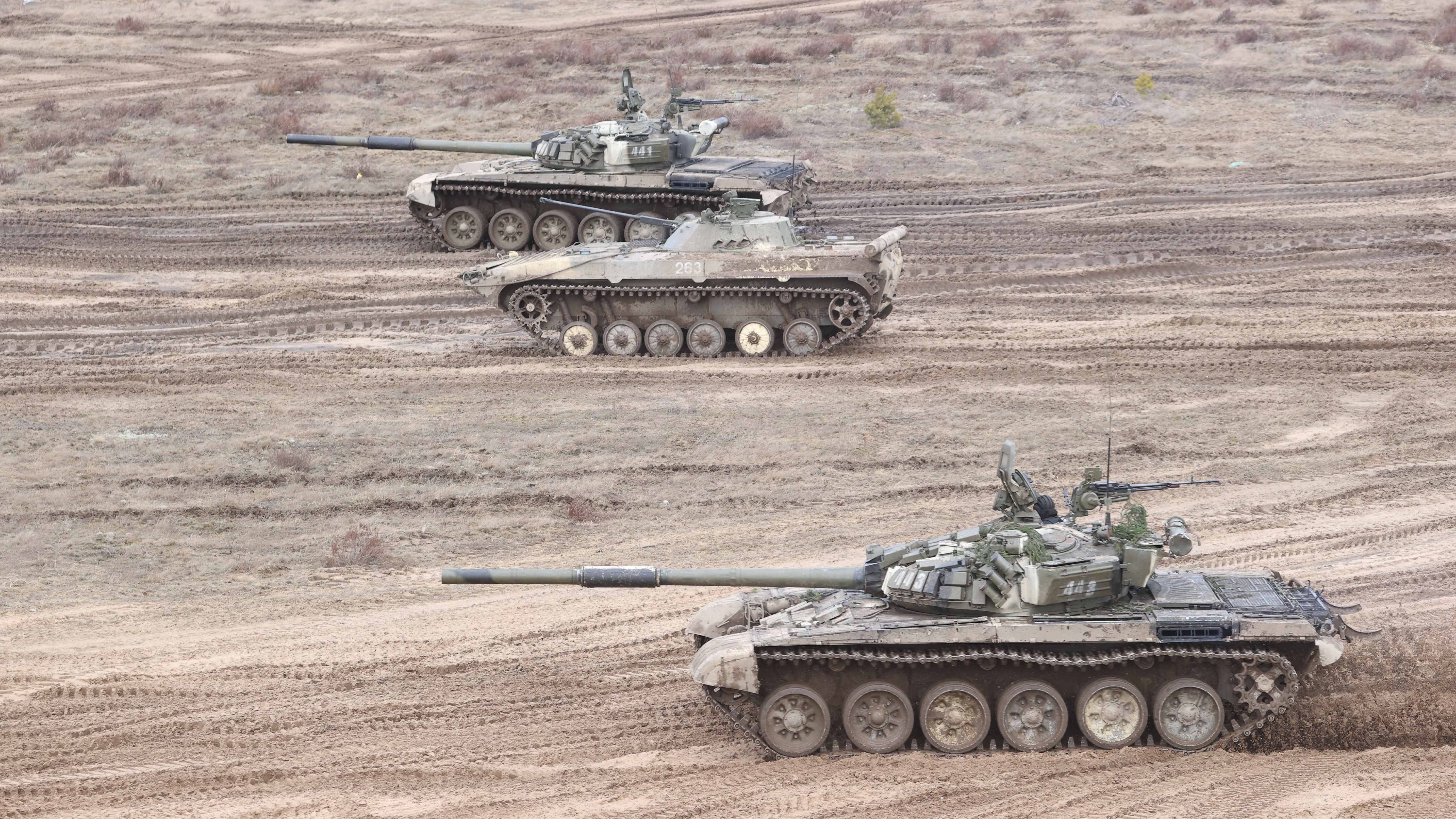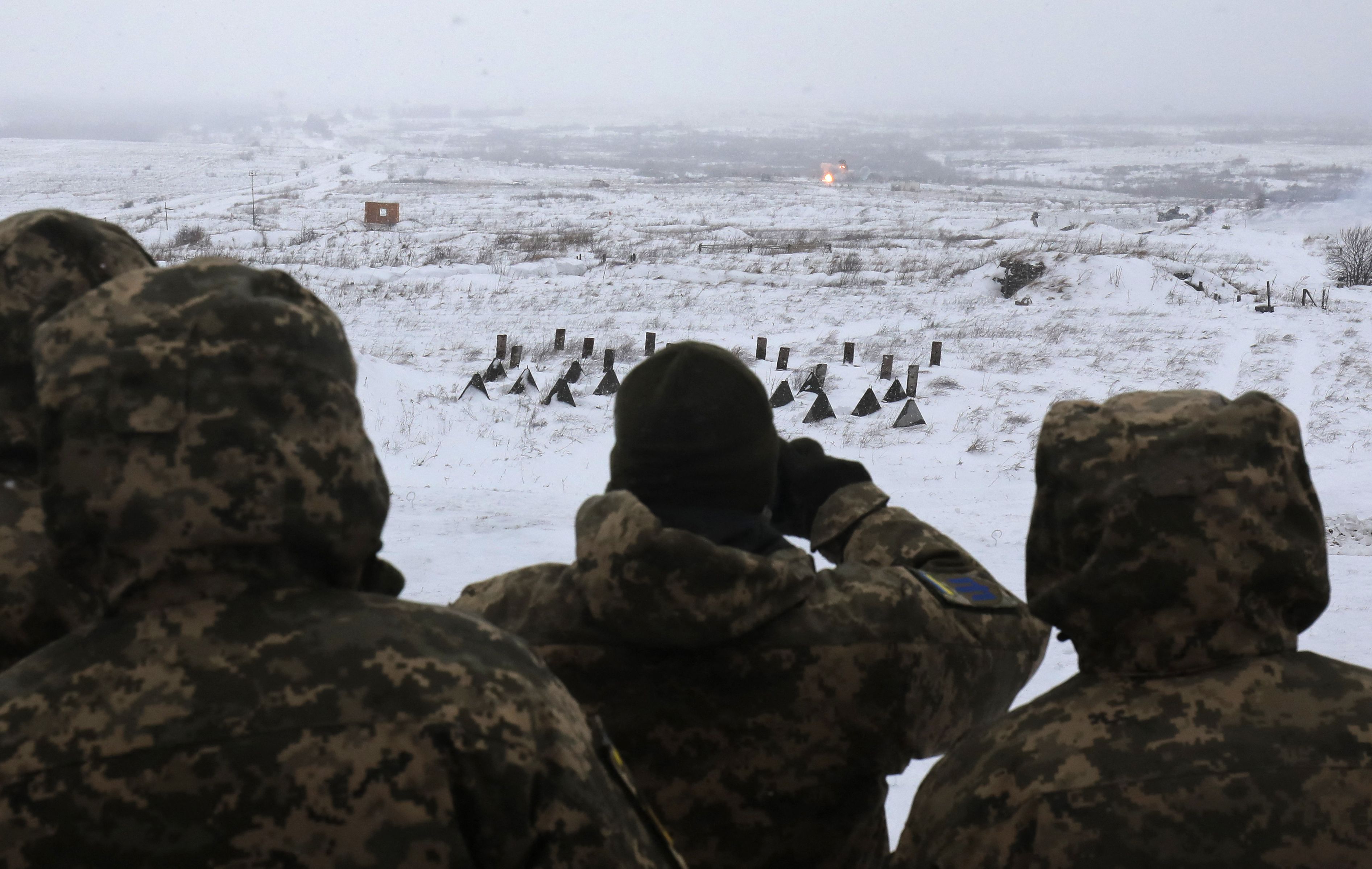Russia on Sunday rescinded earlier pledges to pull tens of thousands of its troops back from Ukraine's northern border, a move that U.S. leaders said put Russia another step closer to what they said was the planned invasion of Ukraine. Residents of Ukraine's capital filled a gold-domed cathedral to pray for peace.
Russia's action extends what it said were military exercises, originally set to end Sunday, that brought an estimated 30,000 Russian forces to Belarus, Ukraine's neighbor to the north. They are among at least 150,000 Russian troops now deployed outside Ukraine's borders, along with tanks, warplanes, artillery and other war materiel.
The continued deployment of the Russian forces in Belarus raised concern that Russia could send those troops to sweep down on the Ukrainian capital, Kyiv, a city of about 3 million people less than a three-hour drive away.
The U.S. has also informed the UN High Commissioner for Human Rights about credible intelligence it gathered suggesting Russia has plans to kill and arrest Ukrainians after an invasion, including specific lists of targets, according to NBC News. This was first reported by the Washington Post.
Get top local stories in Connecticut delivered to you every morning. Sign up for NBC Connecticut's News Headlines newsletter.
In what appeared to be a last-ditch diplomatic gambit brokered with the aid of French President Emmanuel Macron, the White House said U.S. President Joe Biden has agreed “in principle” to a meeting with Russia’s President Vladimir Putin as long as he holds off on launching an assault that U.S. officials warn appears increasingly more likely.
White House press secretary Jen Psaki said the administration has been clear that “we are committed to pursuing diplomacy until the moment an invasion begins.” U.S. Secretary of State Antony Blinken and Russian Foreign Minister Sergei Lavrov are set to meet on Thursday in Europe — as long as Russia does not send its troops into Ukraine beforehand.
“We are always ready for diplomacy. We are also ready to impose swift and severe consequences should Russia instead choose war," Psaki said in statement. "And currently, Russia appears to be continuing preparations for a full-scale assault on Ukraine very soon.”
More Russia-Ukraine Coverage
In Kyiv, life outwardly continued as usual for many on a mild winter Sunday, with brunches and church services, ahead of what Biden said late last week was an already decided-upon Russian attack.
Katerina Spanchak, who fled a region of eastern Ukraine when it was taken over by Russian-allied separatists, was among worshippers crowded into the capital's St. Michael's monastery, smoky with the candles burned by the faithful, to pray that Ukraine be spared.
“We all love life, and we are all united by our love of life," Spanchak said, pausing to compose herself. “We should appreciate it every day. That’s why I think everything will be fine.”
“Our joint prayers will help to elude this tragedy, which is advancing," said another worshipper, who identified himself only by his first name, Oleh.
A U.S. official said Sunday that Biden’s assertion that Putin has made the decision to roll Russian forces into Ukraine was based on intelligence that Russian front-line commanders have been given orders to begin final preparations for an attack. The official spoke on the condition of anonymity to describe the sensitive intelligence.
The United States and many European countries have charged for weeks that Putin has built up the forces he needs to invade Ukraine — a westward-looking democracy that has sought to move out of Russia's orbit — and is now trying to create pretexts to invade.
Western nations have threatened massive sanctions if Putin does.
U.S. officials on Sunday defended their decision to hold off on their planned financial punishments of Russia ahead of any invasion, after Ukrainian President Volodymyr Zelenskyy called passionately Saturday for the West to do more.
“If you pull the trigger on that deterrent, well then, it doesn’t exist anymore as a deterrent," Pentagon spokesman John Kirby told Fox on Washington's sanctions threat.
Russia held nuclear drills Saturday as well as the conventional exercises in Belarus, and has ongoing naval drills off the coast in the Black Sea.
The announcement that Russia was reversing its pledge to withdraw its forces from Belarus came after two days of sustained shelling along a contact line between Ukraine’s soldiers and Russian-allied separatists in eastern Ukraine, an area that Ukraine and the West worry could be the flashpoint in igniting conflict.
Biden convened the National Security Council at the White House on Russia’s military buildup around Ukraine. White House officials released no immediate details of their roughly two hours of discussion.
"We’re talking about the potential for war in Europe,” U.S. Vice President Kamala Harris said earlier Sunday at a security conference in Munich, Germany, that saw urgent consultations among world leaders on the crisis. “It’s been over 70 years, and through those 70 years ... there has been peace and security.”
Zelenskyy on Sunday appealed on Twitter for a cease-fire. Russia has denied plans to invade, but the Kremlin did not respond to Zelenskyy's offer Saturday to meet with Putin.
After a call with Macron, Putin blamed Ukraine — incorrectly, according to observers there — for the escalation of shelling along the contact line and NATO for “pumping modern weapons and ammunition” into Ukraine.
Macron, a leader in European efforts to broker a peaceful resolution with Russia, also spoke separately to Zelenskyy, to British Prime Minister Boris Johnson and to Biden.
Blinken intentionally raised the prospect of a Biden-Putin summit in interviews with U.S. television networks on Sunday, in a bid to keep diplomacy alive, a senior U.S. official said. The official spoke on condition of anonymity to discuss U.S. reasoning.
Blinken said that Biden was “prepared to meet President Putin at any time in any format if that can help prevent a war” and the U.S. official said Macron had then conveyed the offer of talks to Putin — conditioned on Russia not invading — in his phone calls with the Russian leader.
Tensions mounted further, however. The U.S. Embassy in Moscow issued an advisory urging greater caution by Americans in Russia overall. “Have evacuation plans that do not rely on U.S. government assistance,” it warned.
Immediate worries focused on eastern Ukraine, where Ukrainian forces have been fighting the pro-Russia rebels since 2014 in a conflict that has killed some 14,000 people.
In the eastern Ukraine regions of Lugansk and Donetsk, separatist leaders have ordered a full military mobilization and sent more civilians to Russia, which has issued about 700,000 passports to residents of the rebel-held territories. Claims that Russian citizens are being endangered might be used as justification for military action.
Officials in the separatist territories claimed Ukrainian forces launched several artillery attacks over the past day and that two civilians were killed during an unsuccessful assault on a village near the Russian border. Ukraine’s military said two soldiers died in firing from the separatist side on Saturday.
“When tension is escalated to the maximum, as it is now, for example, on the line of contact, then any spark, any unplanned incident or any minor planned provocation can lead to irreparable consequences,” Putin’s spokesman, Dmitry Peskov, said in an interview that aired Sunday on Russian state television.
On the front lines, Ukrainian soldiers said they were under orders not to return fire. Zahar Leshushun, peering into the distance with a periscope, had followed the news all day from a trench where he is posted near the town of Zolote.
“Right now, we don’t respond to their fire because ..." the soldier said before the sound of an incoming shell interrupted him. "Oh! They are shooting at us now. They are aiming at the command post.”
Heintz reported from Moscow and Miller from Washington. Mstyslav Chernov in Zolote, Ukraine, Geir Moulson in Berlin, Aamer Madhani in Munich, Ellen Knickmeyer, Robert Burns, Matthew Lee and Darlene Superville in Washington, Liudas Dapkus in Vilnius, Lithuania, and Yuras Karmanau in Kyiv contributed to this story.



